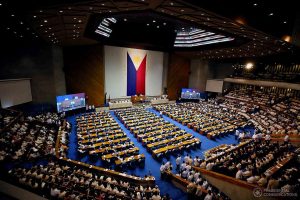Bicam panel forms working groups to reconcile budget bills by Dec. 9
PHILIPPINE lawmakers on Thursday formed working groups composed of technical staff from the Senate Finance and House Appropriations Committees to reconcile a “few” differences their versions of the 2025 national budget by Dec. 9. During the first day of the Bicameral Conference Committee hearings on House Bill No. 10800, the General Appropriations Act of 2025, […]

PHILIPPINE lawmakers on Thursday formed working groups composed of technical staff from the Senate Finance and House Appropriations Committees to reconcile a “few” differences their versions of the 2025 national budget by Dec. 9.
During the first day of the Bicameral Conference Committee hearings on House Bill No. 10800, the General Appropriations Act of 2025, in Pasay City, Senator Emmanuel Joel J. Villanueva moved to create the technical working groups (TWGs), which was seconded by Senate Majority Floor Leader Francis N. Tolentino.
Senator and Finance Committee Chairperson Mary Grace Poe-Llamanzares told reporters on the sidelines of the hearing that there were only “a few major differences” between the budget bills of both chambers, such as funding the Ayuda Para sa Kapos ang Kita Program (AKAP).
AKAP is the Department of Social Welfare and Development’s (DSWD) financial assistance program to workers whose income falls below the poverty threshold.
“We (House and Senate) have similar initiatives so for now, let’s wait and see what the differences will be because, of course, the two will clash,” she said in mixed English and Filipino.
The Senate earlier deleted the AKAP as a line item in DSWD’s proposed budget, opting instead to merge it with another DSWD aid program.
Ms. Poe told a news briefing on Wednesday that senators infused funds meant for AKAP to the senior citizens retirement pension, additional funding for college student assistance, childcare assistance and to livelihood programs.
The Senate approved budget earmarked P245.84 billion for the DSWD, slightly higher than the P226.67 billion proposed by the Budget department and the Executive. The House had approved an allocation of P313.26 billion for the agency.
Speaker Ferdinand Martin G. Romualdez earlier said the House of Representatives will fight to keep funding for AKAP, which is seen as a “stop-gap” measure for working Filipinos with limited income.
Social Welfare Secretary Rexlon T. Gatchalian has bucked the Senate’s move to cut AKAP, telling senators that “millions could fall back into poverty” if they decide to remove it.
The assistance program has aided about four million indigent Filipinos, according to Mr. Gatchalian, with the DSWD already disbursing about P20.7 billion of the total P26.7 billion allotted under the 2024 General Appropriations Act.
Ms. Poe said the working group sessions are likely to start in two days as lawmakers aim to finish reconciling disagreeing provisions in the spending plan by Dec. 9.
She earlier said President Ferdinand R. Marcos, Jr. is aiming to sign the budget by Dec. 19.
Senators approved its version of the national budget on Tuesday with no amendments raised during plenary. The House approved its budget bill in September.
“Hopefully we would be able to perform our job within the prescribed time, within this year so when we start come Jan. 1, 2025, we would have already the approved budget that the Filipino people can rely on…” Senate President Francis G. Escudero said at the hearing.
The Senate’s final version of the national budget had also restored a previously slashed P10-billion funding from the P50-billion allocation for the Revised Armed Forces of the Philippines Modernization Plan in 2025.
The Department of National Defense will also get a P266.28-billion budget amid Manila’s rising tensions with China in the South China Sea.
“It’s up to us in the bicam to bridge the gaps, not just between the House and the Senate but, more important, between what our people need and what we can deliver,” Mr. Romualdez said at the same hearing.
“We’re not just crunching numbers; we’re crafting solutions to real problems faced by real people every single day.” — John Victor D. Ordoñez
















